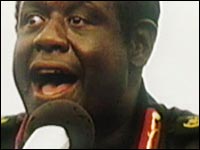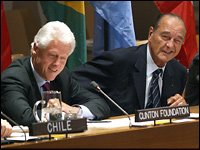 In a movie opening today, The Last King of Scotland, portrays one of the towering and largely despised figures of the second half of the 20th-century, Uganda's dictator Idi Amin. Here is Bob Mondello's review (9/27/2006 - 3:53), with links to an interview with actor Forest Whitaker and with two scenes from the film.
In a movie opening today, The Last King of Scotland, portrays one of the towering and largely despised figures of the second half of the 20th-century, Uganda's dictator Idi Amin. Here is Bob Mondello's review (9/27/2006 - 3:53), with links to an interview with actor Forest Whitaker and with two scenes from the film.Amin seized power in 1971, and ruled Uganda with an iron fist, in the process killing some 300,000 people before he was deposed and forced to flee to Saudi Arabia in 1979, where he died in 2003.
Musings
- What makes a dictatorial leader a hated figure instead of a strong leader? Consider, for instance, what we know about the President of Sudan, Omar Hasan Ahmad al-Bashir, the man largely responsible for the ongoing genocide in the Darfur region of his country?
- What is your sense of the status of Saddam Hussein, and just why and when he earned his current reputation?
- In the theater and films, one sure-fire way to define a strong hero is by creating a strong villain. Does this seem process apply to politics?


















